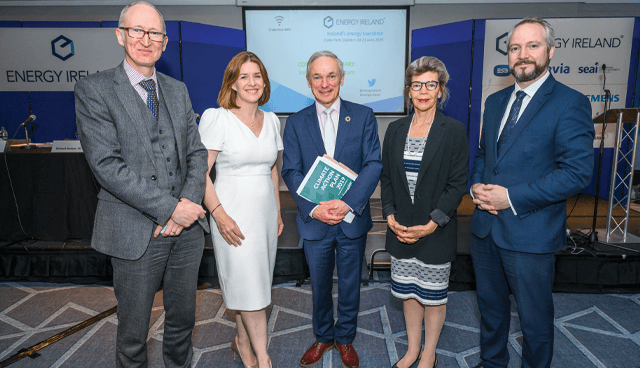Climate Action Plan launched

Announced in late June by Minister for Communications, Climate Action and the Environment Richard Bruton TD, the Government’s Climate Action Plan was well received for its ambitious yet realistic targets. Notable targets include adding 936,000 electric vehicles to the road and 70 per cent of energy being generated by renewable sources by 2030, as well as the deep retrofitting of 500,000 homes.
The Climate Action Plan, which contains almost 200 actions to address the climate emergency recently declared by the Government, contains within the large aim to retrofit 500,000 Irish homes. It is said that homeowners could choose to pay for this retrofitting through either higher property taxes or electricity bills. An “easy pack” model for retrofitting is to be examined by the end of the year and the midlands in particular will have a “major house-retrofitting programme”.
Confusion occurred when the Sustainable Energy Authority of Ireland (SEAI) announced that it had taken the immediate decision to close their deep retrofit pilot scheme due to a lack of funding, in a move that would have financially impacted negatively upon 302 households that had applied before the July deadline given. Minister Bruton then announced that the decision had been reversed and that the 302 households would have their applications assessed and would receive their grants in 2020 if they proved successful.
The Minister also questioned the SEAI’s line that it had shut the scheme due to a lack of funding and the confusion surrounding the issue will have cast doubts over how the extensive work on retrofitting and similar endeavours in the plan will be evaluated.
The plan also includes the provision that all buildings currently under major renovation — 25 per cent of the so-called “building envelope” — must be brought up to a minimum BER rating of B2 by the end of this year. A review on how to replace all gas and oil boilers, set to be banned in new homes from 2025 and 2022 respectively, will be completed by the end of the year, although no new regulation will take effect until 2026.
Retrofitting programmes also include the plan to install 400,000 heat pumps in homes and businesses across the country. National standards will be established for such heat pumps and the Government will undertake initiatives to upskill between 300 and 500 installers for these programmes.
Electric vehicles
The stated goal within the plan is for there to be 936,000 electric vehicles added to Irish roads by 2030, a significant scaling up of the National Development Plan’s aim of 500,000 by that time. Officials at the Department of Transport, Tourism and Sport are believed to have told their counterparts in the Department of Communications, Climate Action and Environment that the original goal could be stretched to 600,000 at most in the months leading up to the publication of the plan.
The Government has committed to a goal of 70 per cent of Ireland’s electricity being derived from renewable sources by 2030, a more than doubling of the current level of 30 per cent that would add 12 gigawatts of renewable energy to the national grid.
There are currently 12,500 electric vehicles on Irish roads and it is understood that Minister for Transport, Tourism and Sport Shane Ross TD wrote to Minister Bruton to express his belief that it would be impossible to achieve the goal of 936,000 by 2030 without an extensive support scheme in place. Local councils will also be given funding to provide 200 on-street charging points per years for their constituencies.
In terms of general transport, the plan also includes the expansion of the country’s cycling path network and park and ride locations. The BusConnects programme is included, while local councils will also be given the power to restrict access to certain areas within their constituencies to zero emission vehicles only. A study on potential congestion charges for cities is to be conducted by the end of the year.
Recycling
Regulations are introduced within the plan to curb the use of non-recyclable single-use plastic by 2021, with the Government committing to “scope out a number of possible environmental levies”, which could possibly include one on single-use plastics. Single-use plastic items such as plastic straws, plates, cutlery and cotton buds will be banned.
The Government’s stated goal is to eliminate the use of non-recyclable plastic and the plan also commits to the introduction and imposition of higher fees on the production of materials that are difficult to recycle.
Renewables
The Government has committed to a goal of 70 per cent of Ireland’s electricity being derived from renewable sources by 2030, a more than doubling of the current level of 30 per cent that would add 12 GW of renewable energy to the national grid. A pilot scheme allowing homeowners to sell surplus energy generated by at-home solar panels back to the national grid is set to be fully rolled out nationwide in 2021. This 12 GW will be made up of:
- at least 3.5 GW of offshore renewable energy;
- up to 1.5 GW of grid-scale solar energy; and
- up to 8.2 GW total of increased onshore wind capacity.
The plan says: “Increasing onshore and offshore wind capacity are the most economical options from the MACC for electricity production. This will include replacing existing coal- and peat-fired plants, as well as installing the new electricity capacity required to meet the increased power demand from transport and residential heating electrification.”
Agriculture
The Climate Action Plan contains plans for the improvement of livestock management, as well as nitrogen and land use. Increased afforestation and better management of peatland and soils are also planned for, with the burning of peat to be phased out by 2028.
Policy
Five-year carbon budgets and sector targets will be set, with the relevant Minister responsible for their enforcement and penalties to be incurred if the targets are not met. These actions will be underpinned by a Climate Action Act.
All government investments and decisions will now be vetted t ensure that they are climate proofed, while every public body will be given a climate mandate by their relevant minister. A Climate Action Delivery Board will also be established.
Carbon tax will rise to €80 per tonne by 2030, with the plan making mention of a “path” to Ireland becoming net zero carbon by 2050, although no concrete commitment to this goal is made. The Government’s current target is for Ireland to be at 80 per cent carbon neutrality by 2050, a goal that climate scientists say is not enough to contain temperature rises within the 2°C, as agreed under the Paris Agreement.





